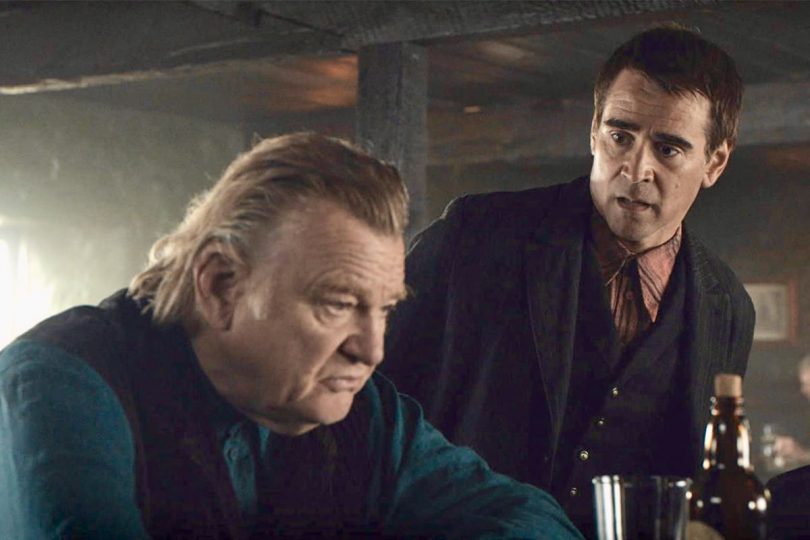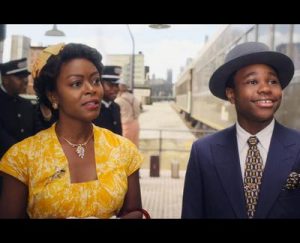You don’t need to know Irish history to catch the symbolism in Martin McDonagh’s “The Banshees of Inisherin” (R, 109 minutes, in theaters).
Two best pals, Colm and Padraic, live on a small island off the coast of Ireland in the 1920s. Then, abruptly and for no apparent reason, Colm ends the friendship and wants nothing to do with Padraic. Padraic refuses to accept Colm’s decision and pesters his former friend, with self-destructive results for both of them.
Meanwhile, explosions can be heard from the mainland, where the Irish Civil War is taking place.
Civil war. Former friend against former friend. Such a waste.
Yeah, we get it.
But that’s just the starting point here. There’s so much more to this dramedy, enough to make it great.
First, and foremost, there are the stars: Brendan Gleeson and Colin Farrell – or, as I like to think of them, the Babe Ruth and Lou Gehrig of Irish actors. Put these two together, as writer-director McDonagh (“Three Billboards Outside Ebbing, Missouri”) did 14 years ago with “In Bruges” and, now, here, and you’ve got a powerhouse duo.
Farrell plays Padraic, a simple, easygoing fellow who lives with his (much smarter) sister, Siobhan (Kerry Condon, also outstanding). Padraic is content with life on the island, whether it’s watching after his donkey or hanging out with the locals at the pub.
Gleeson’s Colm is the older of the two, and he’s concerned that he’s running out of time to do something with his life. He plays fiddle – in the pub and at home, where he lives alone – and he wants to make an artistic contribution to the world by writing music that will be remembered. Instead, he says, he’s wasted too much time with Padraic, whom he declares “dull.” The only way to make something of his life is to have nothing to do with his former friend and focus on his music.
All of this creates somewhat of an uproar, not only between Colm and Padraic, but among the other islanders.
As things escalate, and they do, it’s hard to know which of the friends, if either, is in the right. Should Padraic just accept Colm’s wishes and leave him alone? Is Colm being unnecessarily cruel? Stubbornness is the common denominator – and maybe that’s McDonough’s point about civil war. But we also are made well aware of the humanity of both ex-friends, which makes this arguably absurd situation tragic and heartbreaking.
This could be the miracle here – that we’re drawn so deeply into these characters despite the fact that they’re so frustrating in what they do and say. It’s a credit to McDonagh and his two stars that they make “The Banshees of Inisherin” so beautiful in this way.
Meanwhile, the film digs deeply into the nature and obligations of friendship and family, the drive to create, and, ultimately, the purpose of life. **** (out of four)
Nightmare of the past
Everyone should know the true story of Emmett Till. He was a 14-year-old African American from Chicago who in August 1955, during a trip to Mississippi to visit family, was kidnapped, tortured and executed when a white woman accused him of inappropriate behavior – by the rigid racist standards of the Jim Crow South.
“Till” (PG-13, 130 minutes, in theaters) tells this story, and, as you’d expect, it’s horrific.
Emmett (Jalyn Hall) is a sweet-natured, charismatic youth who’s excited to visit his cousins in Mississippi. His mother, Mamie Till-Mobley (Danielle Deadwyler), whose husband died fighting in World War II, warns Emmett that he has to be “extra careful” around white people in the South. Emmett says he understands, but you get the sense that the naive, fun-loving teen doesn’t fully grasp what she’s saying.
This becomes further evident when he approaches the married, white Carolyn Bryant (Haley Bennett) inside her family’s grocery store and tells her she looks like a movie star. Soon after, he whistles at her in front of his cousins when she steps outside the store. His cousins are mortified; Emmett is confused – he doesn’t realize what he’s done. But he’ll soon find out.
Though Emmett is always at the heart of the story, the film is at least as much about his mother. She appears in the beginning nervous about his trip, and while he’s away she obsesses about his safety. When her worst fears are realized, she initially crumbles in horror and pain, only to emerge with a courageous determination to pursue justice and show the world what has been done to her son. (Deadwyler is very likely to receive a well-deserved Oscar nomination for the power with which she expresses extreme emotions in the role.)
One thing Mamie does is insist Emmett have an open casket at his funeral, so all can see the extent of the brutality he endured as the result of racism and hate.
In a way, this reflects the impact of “Till.” It’s a hard film to watch. You walk in knowing that it will be. (In fact, if the film has a weakness, it’s its predictability.)
But, regardless of the prospect of sitting through a gut-wrenching story, it’s important to see it and remember it. Just as it was for people to see and remember the mutilated face of 14-year-old Emmett Till in his coffin. *** (out of four)
Awkward title, but who cares?
“The Return of Tanya Tucker – Featuring Brandi Carlile” (R, 108 minutes, in theaters) might be the most uninspired movie title of the year. (One of my favorites: “Halloween Ends.” But only if it’s true.)
It is accurate, though, and that’s outstanding news for music fans, since veteran country singer Tucker and current superstar Carlile are both remarkable artists.
The last time I saw Tucker was at the Cape Cod Melody Tent in Hyannis. I figured it was around 10 years ago. It was closer to 30. Yikes.
As Kathlyn Horan’s documentary begins, Tucker has been out of commission for a while. It has been 10 years since she put out an album and almost 20 since she released one with original material. Meanwhile, both of her parents – including her father-manager – have died, which apparently has taken a heavy toll on the former child star, now in her 60s.
Enter Carlile and Shooter Jennings – son of Waylon – who persuade Tucker to let them produce a new album, with Tucker singing songs written by Carlile that are based on Tucker’s life. It’s a challenging task for all concerned. Tucker must overcome her insecurities and loose-cannon personality. But Carlile has her back, cheering her on as she sings (it’s not mere flattery; Tucker’s raspy voice is still amazing), patiently waiting when Tucker doesn’t show up to the studio on time.

Two greats – Tanya Tucker, left, and Brandi Carlile – join forces in “The Return of Tanya Tucker – Featuring Brandi Carlile.” (Sony Pictures)
While dealing with the present, director Horan also uses vintage footage to show how Tucker started from humble begins in Texas, where she and her parents lived in a trailer; how she rose to country-music fame as a pre-teen and became a huge star; how she became cast in the role of rebel for dabbling in rock music (unacceptable for the country crowd at the time), having a highly publicized love affair with the much-older Glen Campbell and gaining a reputation for her hard-partying ways.
Now, thanks to Carlile and Jennings, she’s embarking on a comeback (not necessarily her first), though she refuses to acknowledge it as such. If you know how this effort ends, you’ll be aware of whether this turns out to be a success story. If not, you’ll find the doc suspenseful.
Either way, it’s inspiring not only to see Tucker back at it again in the studio and on the stage, and to see Carlile use her relatively new celebrity to boost one of her childhood heroes. In the process, we learn as much about Carlile’s character as we do about Tucker’s – and that’s a good thing. ***½
A humdrum holiday
Charisma can get you only so far.
George Clooney and Julia Roberts pour on the charm in “Ticket to Paradise” (PG-13, 104 minutes, in theaters), but they can’t save the rom-com from mediocrity.
Clooney and Roberts play David and Georgia Cotton, who once were married and deeply in love, but have been divorced – and not amicably – for years. Though they claim they can’t bear to be in the same vicinity, they must join forces to try to stop their daughter, Lily (Kaitlyn Dever), a recent law school grad, from marrying Gede (Maxime Bouttier), a seaweed farmer – and super nice guy – she meets while vacationing with her best pal, Wren (Billie Lourd), in Bali.
Do you really need to know any more to guess what happens? Didn’t think so. And that’s the thing with this movie. It’s a paint-by-numbers feel-good product that allows us to vicariously visit a beautiful locale (yes, the movie is our “ticket to paradise”) while watching four attractive, likable people sort out their romantic issues (with Lourd’s amusing Wren watching from the wings).
There’s nothing particularly wrong with this film. It’s harmless, like a fairly entertaining TV sitcom. And you’ll probably forget about it as soon as it’s over. **½
** Click here for Tim Miller’s previous movie columns for Cape Cod Wave **
Please like Cape Cod Wave on Facebook.
Cape Cod Wave Magazine covers the character & culture of Cape Cod. Please see our Longform stories.
Tim Miller is a Cape-based member of the Boston Society of Film Critics. He also teaches film and journalism at Cape Cod Community College in West Barnstable. You can contact Tim at [email protected] or follow him onTwitter @TimMillerCritic. Or you can ignore him completely.



































